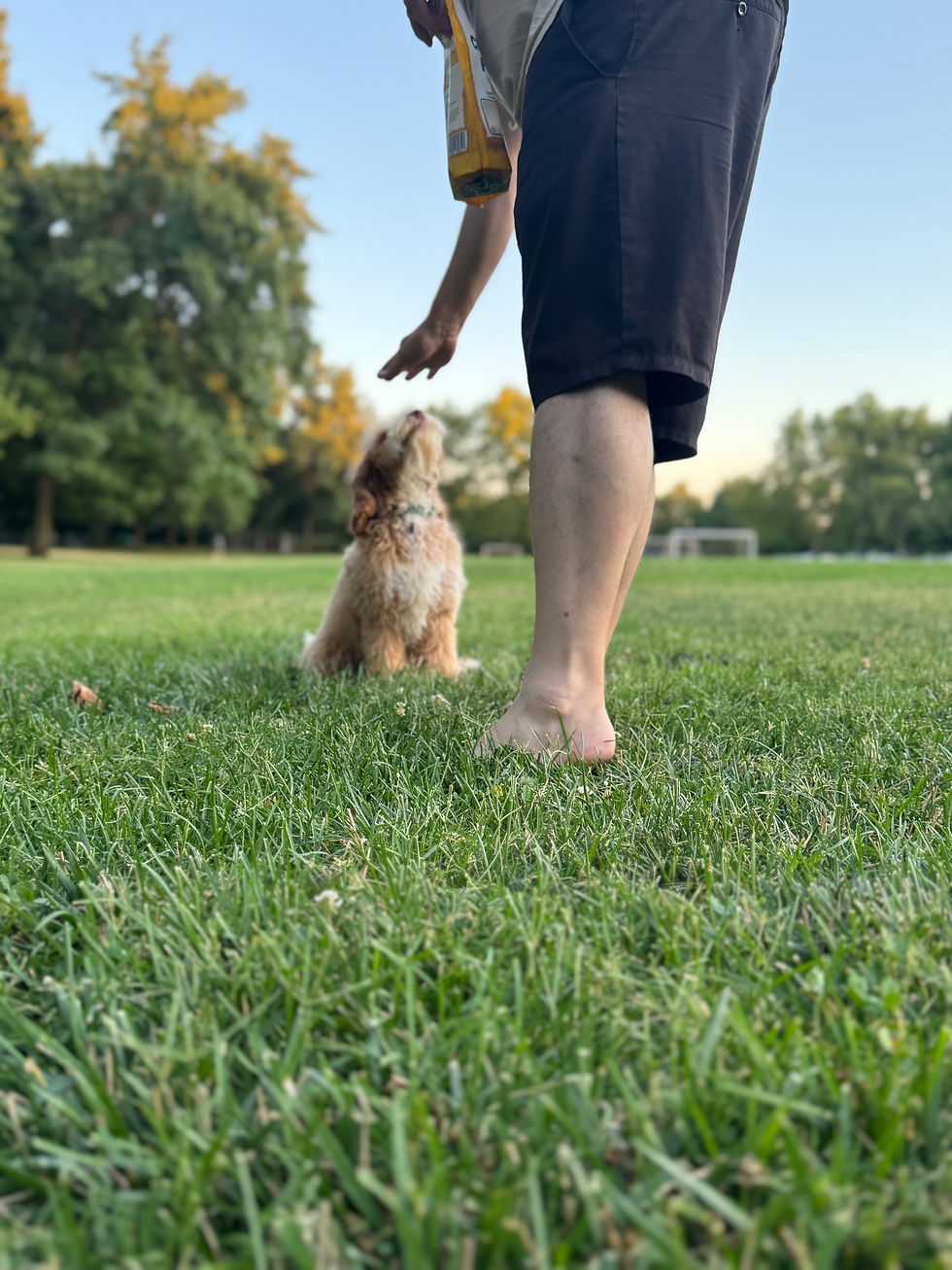Your Puppy’s First Vet Visit: What to Expect for the Bloom and Beyond Litter
- Katie Gorman
- Aug 19, 2024
- 4 min read

Bringing home a new puppy is an exciting and joyful time! As part of ensuring your little one has the best start in life, we take the puppies to their first vet visit. For the families welcoming a puppy from our Bloom and Beyond litter, here’s a detailed guide on what to expect during that crucial first vet visit.
1. Physical Examination
The vet will start by performing a thorough physical examination of your puppy. This includes checking your puppy’s:
- Eyes and Ears: The vet will look for any signs of infection, redness, or discharge. Puppies are prone to ear infections, especially those with floppy ears like Australian Labradoodles, so it’s important to catch any issues early.
- Mouth and Teeth: Your vet will inspect your puppy’s gums, teeth, and palate. They’ll check for proper bite alignment and ensure there are no signs of dental issues or gum disease.
- Heart and Lungs: Using a stethoscope, the vet will listen to your puppy’s heart and lungs to ensure there are no irregularities or signs of respiratory issues.
- Abdomen: The vet will gently palpate your puppy’s abdomen to check for any abnormalities, like hernias or unusual lumps.
- Skin and Coat: Your puppy’s skin and coat will be examined for signs of parasites, such as fleas or ticks, as well as any rashes or dryness. The vet will also assess the overall health of your puppy’s coat, which is important for our low-shedding Australian Labradoodles.
2. Weight Check and Growth Monitoring
The vet will weigh your puppy and assess their growth. Puppies grow rapidly, so it’s important to ensure they are gaining weight appropriately. The vet may also measure their body condition score (BCS) to ensure they are at a healthy weight for their age and breed.
3. Vaccinations
Vaccinations are a crucial part of your puppy’s first visit. Depending on their age, your puppy will receive their initial vaccines or booster shots. Common vaccines include:
- Distemper, Parvovirus, and Adenovirus (DAPP): This combination vaccine protects against several serious diseases.
- Bordetella: Often recommended for puppies who will be in contact with other dogs, this vaccine helps prevent kennel cough.
The vet will set up a schedule for any follow-up vaccinations to ensure your puppy stays on track for full protection.
4. Parasite Prevention
Parasites can be a concern for puppies, so your vet will likely discuss preventative treatments. These may include:
- Flea and Tick Prevention: Your vet will recommend a suitable product to keep fleas and ticks at bay.
- Heartworm Prevention: This is particularly important in areas where mosquitoes are common, as they can carry heartworm.
- Deworming: Puppies are often treated for intestinal worms, which can be common in young dogs. Your vet may administer a deworming medication and discuss a schedule for follow-up doses.
5. Microchipping
If your puppy will be microchipped at the first vet visit. A microchip is a tiny device implanted under the skin that contains a unique identification number, which can be scanned by a vet or animal shelter. This is an important safety measure that increases the chances of being reunited with your puppy if they ever get lost.
6. Behavior and Training Guidance
Your vet may provide some basic advice on puppy behavior and training. This might include tips on potty training, socialization, and handling common behavioral issues like nipping or chewing. It’s also a good opportunity to ask any questions you have about raising your puppy.
7. Nutrition Advice
Proper nutrition is key to your puppy’s growth and development. Your vet will likely discuss your puppy’s diet, including recommendations for high-quality puppy food. They may also provide guidance on feeding schedules and portion sizes to ensure your puppy is getting the right nutrients.
8. Spaying/Neutering Discussion
While it may be too early to schedule, your vet will likely discuss spaying or neutering your puppy. They’ll explain the benefits of the procedure, the ideal timing, and what to expect during recovery. This is also a good time to ask any questions you have about the process.
9. Establishing a Health Record
Your vet will begin a health record for your puppy, which will include details from the examination, vaccination history, and any treatments given. This record is important for tracking your puppy’s health as they grow and will be useful for any future veterinary visits.
10. Questions and Concerns
Finally, your vet will give you the opportunity to ask any questions you may have. Whether it’s about training, nutrition, or general puppy care, don’t hesitate to bring up any concerns. Your vet is there to support you and help your puppy thrive.
Final Thoughts
The first vet visit is a significant milestone in your Bloom and Beyond puppy’s life. It sets the foundation for their long-term health and well-being. Here at Shasta Royal Monroe we make sure your puppy has at least one exam before they go to their forever home. Remember, regular veterinary care is essential to keeping your puppy healthy, happy, and ready to bloom into the wonderful companion they are destined to be.
If you have any questions before your puppy’s vet visit or need recommendations for a veterinarian, feel free to reach out. We’re here to support you and your new furry family member every step of the way! Check out our available puppies page to see the Blooms and Beyond litter and planned litters.






Comments